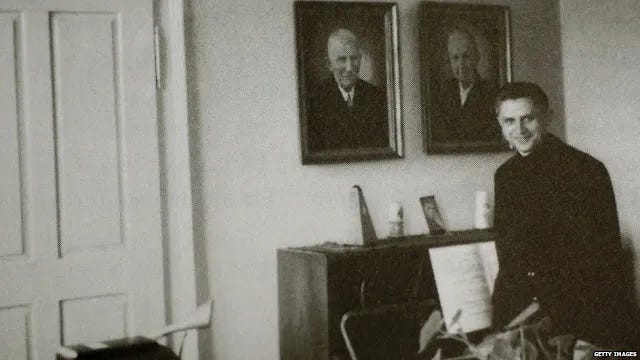Pope Benedict, as all popes do, left a Spiritual Testament, a short summary of his beliefs to be read after he was dead. Benedict devoted a good portion of his Testament to science (my paragraphification):
What I said earlier of my compatriots, I now say to all who were entrusted to my service in the Church: Stand firm in the faith! Do not be confused! Often it seems as if science – on the one hand, the natural sciences; on the other, historical research (especially the exegesis of the Holy Scriptures) – has irrefutable insights to offer that are contrary to the Catholic faith.
I have witnessed from times long past the changes in natural science and have seen how apparent certainties against the faith vanished, proving themselves not to be science but philosophical interpretations only apparently belonging to science – just as, moreover, it is in dialogue with the natural sciences that faith has learned to understand the limits of the scope of its affirmations and thus its own specificity.
It has to now be clear, even to the meanest intelligence, that science is often wrong, even usually wrong when the science is new. This applies in the strongest sense to the sciences of the most complex things, which are us, and which are the sort of sciences we usually cover. But this sad state is also found in the science of the simplest things, like physics.
You’ll find no better chronicler of how physics goes wrong than Scott Locklin (and here). Sabine Hossenfelder (yes, that same Hossenfelder we often tease) also provides us a nice service on this front, from time to time, as in this video:
If you’re like me, you hate watching videos because they are so slow. So you’d do little harm to the content to start this one at ten minutes. Hossenfelder has a succinct telling cartoon on how easy it is to make models, which is to say to create theories, and how difficult it is to give them up once made.
Point is this: you’d do best by shorting all new announced “discoveries”. All science is not good science, nor does all science describe Reality as she is. Common experience shows it increasingly likely, for all the many reasons we discuss, that most new science is wrong science.
Knowing nothing else (this is strict!) except that it is new, it is best to bet against it. This will fail you at times, of course. Yet even when it does, it’s not likely to cost you much. That’s because most new true science has little effect on you, or none.
Suppose one of the current speculations in cosmology turns out to be true. There really is some new particle that carries some “dark” force, which comprises “dark matter” and emits “dark energy”, or whatever. As fascinating as this would be to learn, and as much respect we’d rightly accord the discoverers of this particle or force, it would mean next to nothing to the vast majority of people. (My guess, for the little it is worth, is that gravity will be modified, and no new dark particle etc. exists.)
It would be unlikely engineers could harness this distant untouchable particle and make you, say, a superior washing machine. It couldn’t add speed, though perhaps it might boost the heft, to the thinking suppression cum tracking device you carry everywhere.
Benedict was thinking of how new science, even if true as we imagine here, serves as propaganda to academic Reddit-like neck-beards and other materialism scolds: “The new dark particle finally proves God does not exist,” they might insist.
They’d continue with something like, “We now know the universe is capable of self-organization.”
Which is false. At best, you’d know how some large-scale features have the shape they do. Which is neat to know, but it still leaves you blind why it’s these causes of these shapes and not something else.
Science is the pursuit of causes of measurable things. Even when, or if, science can give the complete cause—the material, formal, efficient, and directing or final causes—of an observable, it cannot say why this cause is the way it is. It can only accept.
There still has to be a reason why the world has the causes that it does, that it contains the essences we see. There has to be a reason why this is the Way Things Are, and that reason cannot be “chance”. Because even if that absurdity were true, there still has to be a reason this “chance” exists, and why caused things in the way it caused them.
And then, of course, most science is not true. Either way, Benedict is right. There is nothing in science that should affect your faith.
Subscribe or donate to support this site and its wholly independent host using credit card click here. Or use the paid subscription here. For Zelle, use my email: matt@wmbriggs.com, and please include yours so I know who to thank.





Thoughtful article!
Why are some scientists still wagng this fake war between science and faith? Who is fighting it if not fake scientsists out of ignorance, fear and foolishness? What is their motive, if not patently ideological, to drive a political stake through the heart of man and kill God?
Catholicism made peace with science centuries ago, on terms advantageous to science and the faith. Scientists owe the Church and God an unpayable intellectual debt and infinite spiritual gratitude.
Show eternal gratitude, not the malice of academic envy!
Stop your war on religion, scientists! God is your creator and your guide, not your enemy.
The intelligibility of the universe is perhaps the greatest argument for God's existence.
How much damage was done to our societies by the New Atheists? I can't help but notice how many absurdities took root in the western world (formerly Christendom) after their popular books exploded on the scene. And here we are...arguing about what a woman is.